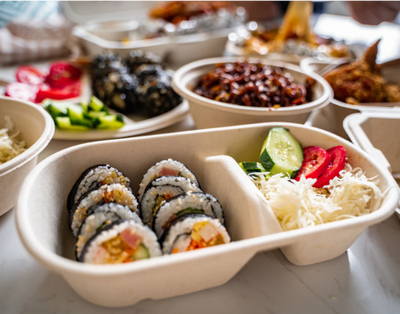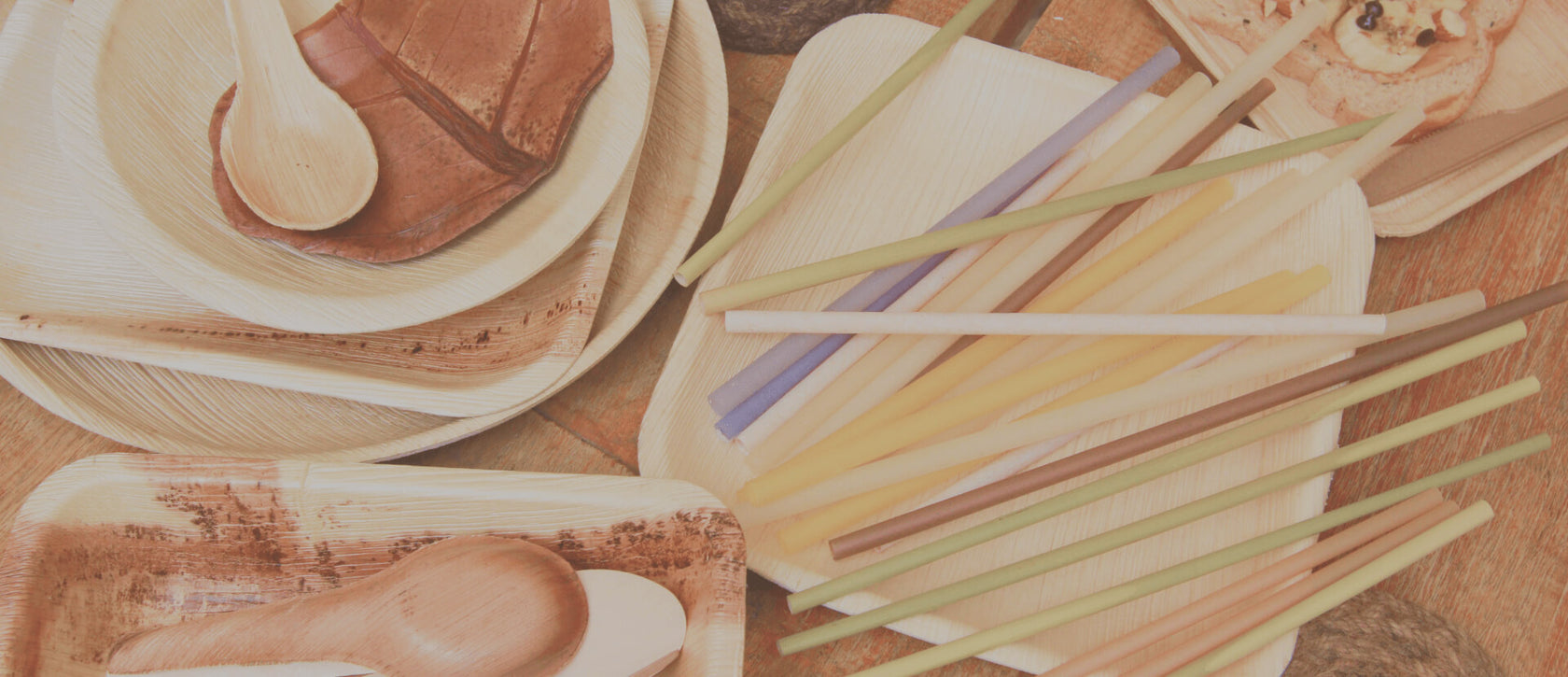As the global goal to create a sustainable environment continues to strengthen, more and more people are searching for alternative solutions. Among these alternatives, compostable and recyclable products have become increasingly popular with consumers. Despite sharing some similarities, what is the real difference in compostable vs recyclable products? Are compostable and recyclable one and the same, or are there distinctly polarizing differences between them?
What Is Compostable?
Compostable vs recyclable – two words that go hand in hand when discussing methods of sustainable living - but what do they really mean?
Put simply, compostable products are designed to break down into natural materials over time, either in a home compost pile or through industrial methods. This means that instead of being sent to permanently reside in landfills, they can effectively decompose. You can find an increasing variety of certified compostable products online or at your local grocery store.
Unlike recyclables that are processed and reused many times over, composting produces a nutrient-rich soil additive once broken down. This soil can be used for gardening and agriculture.
What Is Recyclable?
Recyclable items, on the other hand, are designed to be reused rather than broken down. They can be taken apart, and their parts used again in new products.
Common items that can be recycled include paper products like newspaper and cardboard, plastics like bottles and containers, glass jars and bottles, aluminum cans, steel cans, and many more.
Although recyclable products reduce unwanted waste overall, it is still recommended that you choose compostable items over recyclables whenever possible, as it is assuredly the more environmentally friendly option.

Source: Internet
>> Read more:
- What Is Climate Change: Causes, Impact on Humans and Animals
- What is Net Zero: Importance, Roles of Individuals and Organizations
- Why Should You Choose To Use Reuseable Straws?
What Is The Difference Between Compostable and Recyclable?
Compostable vs recyclable items have their own benefits that can help reduce waste, conserve natural resources, and positively impact our planet. Though they serve the same purpose, they have some undeniable differences you should notice.
Compostable materials are typically biodegradable and are broken down by natural organisms such as bacteria and fungi into nutrient-rich soil. Common examples include organic straws and eco-friendly bowls/ food containers. The benefit of using compostables is that they are environmentally friendly, as they don’t take up space in landfills or contribute to greenhouse gas emissions like traditional plastics do.
Recyclable items are made from materials like glass, plastic, metal, paper, cloth, or cardboard. These items can be collected from households and businesses and then sorted at a recycling center, where they will be transformed into new products. This process conserves natural resources like water and energy while reducing the amount of waste that goes to landfills.
Now that we have understood some of the key differences between compostable and recyclable products, let’s elaborate! While recycling is essential in preventing further waste accumulation, its efficacy depends on an intricate system that takes time and energy. Composting, however, breaks down the material into nutrient-rich soil that can be used for plant growth and maintains a healthy ecosystem in our environment – something we all can appreciate!
What You Should Recycle & What You Should Compost
A common question asked by many people is whether something should be composted or recycled. Compostable vs recyclable items require making an important distinction in order to help reduce the amount of trash being sent to landfills.
Organic materials such as food scraps, plant-based products, and yard trimmings are ideal for composting. They’re biodegradable and can be turned into nutrient-rich soil for gardens and landscapes.
Recycling is comparatively best suited for non-organic materials such as plastic containers and bottles, aluminum cans, cotton bags, cardboard boxes, and paper products. These items cannot break down, but they can easily be reused instead.

Source: Internet
Why Is Compostable Better Than Recyclable?
Compostable products offer various superior benefits over traditional recycled goods. For one, they can be broken down in a much shorter amount of time—in some cases, taking mere weeks or months instead of years.
Compostables also require less energy in production as they're not subjected to the same heat-intensive processes that recyclables go through when being reprocessed for reuse. When organic materials are composted, they break down into a nutrient-rich fertilizer that can be used to help plants and crops grow.
Seeing as compostables aren’t required to be sorted from other trash as recyclables do, there's less waste sent to landfills overall. Overall, composting helps reduce greenhouse gas emissions by trapping carbon dioxide in the soil and reducing landfill waste.
On the other hand, while recycling provides some environmental benefits, it is often not as effective as composting when it comes to climate change mitigation. Recycling processes require energy to transport and sort materials, whereas with composting the only energy required is from transporting the finished product back to where it was needed.
>> Read more: Compostable Vs. Reusable Straws: Which One Is The Best Eco-Friendly Alternative
EQUO Compostable Straws - Sustainable Alternatives to Plastic Straws
So now you can distinguish between compostable vs recyclable, you may want to choose a compostable alternative to your usual plastic products, such as plastic straws. If that is the case, look no further than EQUO! We offer compostable drinking straws that will satisfy buyers with the most complex checklists! Our selection of compostable straws are all made from 100% natural materials and offer an eco-friendly alternative to traditional plastic straws. Including but not limited to sugarcane, coffee, coconut, grass, and edible rice straws!
- Sugarcane straws: Our original ‘non-soggy’ straws, are tasteless and suitably shaped for enjoying juice, smoothies, and bubble teas. Our biodegradable sugarcane straws are available in various sizes and have an aroma that's vaguely reminiscent of sweet brown sugar.
- Coffee straws: Made from coffee grounds, this biodegradable straw is unbreakable and durable, so can be effective when used for all kinds of beverages. Free of caffeine and flavorless, the straw can stay intact for up to 12 hours and may be safely used several times a day.
- Coconut straws: With the added quality of being resistant to sogginess, these straws have a Tropicana coconut aroma that compliments the taste and aroma of drinks - and are also comparable in consistency to traditional straws! The coconut straw is perfect for sipping juices or drinks with thinner consistencies.
- Grass straws: Made from Vietnam’s grass, this straw also never gets soggy. It is tasteless and perfect for fresh juices. Grass straws do have a faint aroma, without any accompanying flavor, and smell like the comforting aftermath of an afternoon rain shower. Who knew a natural straw could make one feel so nostalgic?
- Rice straws: This variation is made from rice and tapioca starch, and is also edible. Deliciously enjoyed by those that choose to eat these unique products, they don’t add flavor or disconcerting aromas to your beverage. EQUO rice straws can also be purchased in various colors suitable for juices, smoothies, and teas, you can even find one for each day of the week!
The most convenient aspect of EQUO plant-based compostable straws is that they can be disposed of in your home compost bin without any strenuous effort or impact on the environment. Unlike recyclable plastic straws, which still require a large amount of energy to be recycled properly, our biodegradable compostable straws break down into nutrient-rich soil within weeks or up to 12 months - meaning no waste is left behind and it disappears without a trace!

Source: Internet
>> Read More:
- Coconut Straws: A Sustainable Alternative To Plastic Straws
- Biodegradable Sugarcane Straws For Drinks: How Are They Made?
- What Are Grass Straws? Why You Should Use Grass Straws
- 5 Best Compostable Straws On The Market
Compostable and recyclable products are both beneficial to the environment, yet compostable items go one step further in protecting our planet. Not only do they reduce waste, but they can also be used to help replenish and nourish the soil. The next time you’re shopping for everyday essentials, remind yourself to consciously seek out compostable products whenever possible. However small it may seem, this simple change can further make a real difference to the future of our planet.
EQUO provides earth-friendly and reliable solutions to our wasteful habits. From biodegradable straws and utensils to food containers, immerse yourself in a plethora of options that are all compostable! Whether you are looking for an individual package or stocking up in bulk, EQUO products offer convenience at an affordable price. Why not make the switch today? Help us reduce plastic waste and fight for a more sustainable future with EQUO! Let's make each purchase count!
Contact Information:
- Website: https://shopequo.com
- Fanpage: https://www.facebook.com/equointl
- Twitter: https://twitter.com/equointl
- Linkedin: https://www.linkedin.com/showcase/equo-international/
- Instagram: https://www.instagram.com/equointl/


